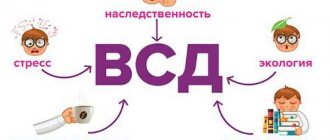.
Every person has to deal with stress. This condition is caused by exposure to both negative and positive factors on the body. Any emotional shock leads to changes in life and health. During stressful situations, the body begins to produce adrenaline, which is necessary to overcome the problem that has arisen, so short-term stress is even useful because it forces us to move forward and improve ourselves. However, with prolonged negative effects, disruptions begin in the body’s functioning. Chronic stress poses a particular danger to mental and physical health.
Chronic stress is extremely dangerous
Stressful state
The consequences of this condition appear after prolonged stress on the nervous system. The central nervous system functions in two processes - relaxation and a state of excitation. Violation of one process entails a number of symptoms: irritability, headaches, insomnia, absent-mindedness and aggression. The consequences of severe stress are chronic changes in behavior, treated with tranquilizers, sedatives and deep psychoanalysis.
What does stress lead to? The reaction of the human body is unpredictable. The symptoms of the consequences depend on the person’s life, his environment and the factors that trigger stress. Why stress is dangerous:
- irreversible changes in the victim’s personality;
- pathologies of internal organs;
- development of mental disorders;
- adaptation disorder;
- destruction of the relationship between the stressed person and his environment.
Stress and its consequences depend on the frequency of stressors (events, people, memories that frighten a person). Fear is normal. Short-term emotional protection creates minimal harm to the body.
Constant tension is dangerous for mental and physiological health: the more often a person is in fear, the harder it is to get rid of the root cause of stress.
Causes of stress
Negative emotions arise against the backdrop of difficult life situations. The reasons for a difficult moral situation can be hereditary factors, hormonal changes in the body, physical changes, psycho-emotional stress, disruption of the daily routine, and relationship problems.
It will not be possible to avoid the causes of stress in the modern world, but every person can develop stress resistance.
The body's protective reactions can be regulated through breathing exercises, sports, yoga or other activities that require concentration and strength.
Reaction to stress
The reaction to stress is the consequences that have to be dealt with. Frequent panic attacks or insomnia create the preconditions for the development of a mental disorder. The frequency of human diseases directly depends on the frequency of reactions to stress. A weakened body cannot resist even the slightest threat: infectious or viral diseases. Symptoms of stress:
- cardiopalmus;
- headache;
- confusion;
- memory loss;
- increased sweating;
- pain in the chest and heart;
- abdominal cramps;
- chills;
- speech disorder.
Headache is one of the symptoms of nervous tension
Smells, sounds, memories, or hallucinations of the traumatic event may lead to the development of symptoms. The “stimulus” ended, but the signs of fear remained.
The negative experience experienced forces the psyche to defend itself: a person falls into forced apathy and escapes (the brain partially blocks memories or distorts the perception of reality). Psychoanalysis and a set of exercises help to get rid of the effects of stress.
Stress Relief Methods
What to do in a situation of strong emotion?
What methods can be used to relieve severe tension? Let's look at a few techniques.
- Doctor Vetoz's method. To streamline your emotional state and cope with anxiety, you can use imaginary generation. Close your eyes and begin to mentally draw an infinity sign - a horizontal figure eight. Imagine the sign on a black board, draw it with chalk.
- Breathing techniques. Doing the exercises is easy, just understand the essence of proper breathing. For example, if you have severe anxiety, start listening to your breathing, tracking your inhalation and exhalation.
- Affirmative formulas. You can relieve fear and nervousness using special formulas in the form of a positive phrase. It’s worth saying it to yourself in a situation of unexpected shock. Example: “Stop. I'm calm" or "Stop. The fear goes away."
- Switching from the problem. You can get away from negative thoughts after experiencing trauma by switching to another activity. Physical activity, singing out loud, active dancing, running in the morning, breeding ornamental birds. Any active activity will help relieve stress. Self-absorption is dangerous; negative thoughts will interfere with life.
- Meditative techniques. Training in Eastern practices for stress relief is effective. Meditation is pleasant, it calms, relaxes, and relieves anxiety.
- Massage, acupuncture, leech treatment. You can relieve stress using unconventional methods in combination with additional treatment.
What to do if the above methods do not help? Try resorting to prayer; faith saves you in many difficult situations.
Video: “How to cope with stress properly”
Health effects of stress
Stress and its consequences are dependent concepts: severe trauma takes longer to resolve. A tense state disrupts the rhythm of life. It is difficult for the patient to navigate what is happening, to recover from severe stress without feeling devastated. The victim’s internal organs also suffer from mental stress: the cardiovascular system, stomach and intestines, endocrine system.
The human body weakens, and irritability gradually turns into apathy. People with stress from work or problems in their personal lives develop indifference to loved ones and the world around them. Due to constant stress, sleep is disturbed: the brain does not relax, confusion appears, and the severity of reactions weakens.
Psychosomatic diseases
The psychosomatic consequences of a severe stress state appear against the background of weakened immunity. Reduced activity and lack of appetite deplete the body: reduced immunity cannot resist diseases. Consequences of severe emotional stress:
- stroke;
- stomach and intestinal ulcers;
- chronic insomnia;
- decreased concentration;
- migraine;
- depression;
- sexual dysfunction;
- asthma;
- atherosclerosis.
The pathologies that arise depend on the state of the human body before the stress experienced. Increased anxiety, aggression and neuroses are accompanied by inflammation of chronic diseases. Eczema and dermatitis occur in people who cannot cope with anxious thoughts.
Stress is dangerous due to mental illnesses, such as split personality, penetrating trauma syndrome. For sick people, reality changes and adapts to their fears.
Children who have experienced domestic violence suffer from attention deficit disorder: the child exhibits symptoms of a fictitious disease. Over time, this syndrome develops into severe chronic diseases. A stressful state reduces professional activity. During home treatment and taking sedatives, the conductivity of brain neurons decreases. Memory is impaired, work ability decreases, and concentration is lost.
Asthma may be psychosomatic in nature
Medicines to increase appetite
Starting to correct your appetite without a doctor’s advice is extremely risky.
First of all, it is necessary to make sure of the cause of the eating disorder, since the methods of treating psycho-emotional disorders are extremely different from the treatment of somatic diseases.
Restores appetite in anorexia nervosa syndrome, depression and neurosis.
Indirectly affect appetite and improve psycho-emotional state.
Regulate metabolism and increase tone.
Participates in metabolic processes and restores the metabolism of fats, proteins, and carbohydrates, thereby regulating eating behavior and appetite.
Chronic fatigue and chronic stress
In psychology, there are three types of human behavioral reactions to stress. The first reaction is conventionally called “foot on the gas” - the person is angry and constantly agitated. Under the pressure of circumstances, he literally boils, only negative emotions arise in him. The second state - “foot on the brake” - is characterized by isolation and withdrawal of the victim from the outside world. He closes himself, hides behind a mask of indifference. The last and most dangerous reaction to stress is “feet on both pedals.” The person is tense and constrained, it is difficult for him to pull away, but he is not able to throw out his emotions.
Chronic stress occurs against the background of any reaction of the body: the decisive factor is the duration of the symptoms of a serious condition. The body is weakened by violent emotions and attempts to escape consciousness. Long-term stress leads to complete emotional burnout.
Some people become lethargic under stress
Symptoms of burnout
The consequences of emotional instability, burnout, are accompanied by special symptoms. Signs of emotional burnout are divided into 3 groups:
- Cognitive. The victim exhibits memory problems. He only focuses on negative situations. Constant anxious thoughts accompany emotional burnout. Changing the victim's mindset is the most difficult task. The anxiety does not go away during the day, and at night the anxiety results in nightmares. The person feels tired, insensitive, lethargic.
- Emotional. The consequences of burnout are expressed in the acquired character traits of the victim: he is capricious, demanding, and quick-tempered for any reason. A person suffering from stress is overcome by feelings of loneliness and isolation. Depression and sadness are the main symptoms of burnout.
- Behavioral. The behavioral consequences of burnout are more common in adolescents and children. The victim is undernourished or overeating, hides from other people, and suffers from insomnia. The victim of stress cannot and does not want to complete the assigned tasks.
The effects of burnout manifest themselves in one or more symptoms. Loss of control over their emotions by expressive people occurs with increased aggression: a person destroys himself, his environment, and relationships.
In women, burnout is expressed by frigidity and sexual coldness. In men, burnout can manifest as sexual dysfunction.
Chest pain and tachycardia are two symptoms that indicate chronic stress. Fatigue coupled with aggression or inaction characterize chronic stress. Only a specialist can determine how advanced the disease is. It is very difficult to get rid of a protracted problem without the help of a specialist.
Destruction of relationships
Stress itself cannot lead to antisocial behavior of the victim; the consequences of a stressful state are responsible for the destruction of relationships in the family and at work. Psycho-emotional changes affect the perception of the world and people around you. A person in a state of constant tension is not able to objectively assess the situation. Conflict is a consequence of chronic stress: an aggressive attitude turns into a constant response. Irritability leads to a narrowing of the social circle. If a person feels morally bad, he splashes out negativity on loved ones, friends or colleagues.
Intrafamily relationships also suffer from the effects of stress. Communication between spouses is disrupted. Hot temper and suspiciousness disrupt harmony in the family: a person tries to relieve tension by splashing out negative emotions. In intimate terms, the victim is cold and uninitiative. Lack of sex life affects the relationship of spouses.
Prolonged stress is dangerous for work relationships. Conflict and temper lead to confrontation in the workplace, dismissal and loss of stable income. People with an apathetic state due to depression lack zeal for work - the employee receives constant criticism from colleagues and superiors, which aggravates his condition. The body launches additional defense mechanisms: the employee quits, falls into even greater depression, and loses the meaning of life.
Family relationships suffer greatly from stress
Treatment options
The severe effects of stress must be relieved with the help of a specialist. The doctor will assess your general condition, select treatment, help you recover from strong experiences, and relieve symptoms. Basic treatment includes a combination of psychotherapeutic techniques and medications. The approximate program includes the following procedures:
- Doctors' examinations. Therapist, physiotherapist, cardiologist and others.
- Consultation with a psychotherapist, designation of a course of work.
- Prescribing tests according to indications.
- To relieve the effects of stress, you should regularly attend classes with a psychotherapist. Work can be done individually or in a group.
- Therapeutic relaxation exercises. It should be done regularly, then the effect will be long-lasting.
- Medication treatment includes prescribing medications to relieve anxiety. This could be a herbal-based sedative, for example, Persen, or a chemical-based sedative, for example, Afobazol. Potent drugs are prescribed only by a doctor, based on the patient’s condition.
- In maintenance therapy, therapists must include proper nutrition, vitamin complexes, and adherence to a daily routine.
Combating the effects of chronic stress
Comprehensive exercises will help get rid of severe nervous tension: a person undergoes emotional therapy and performs physical exercises. Complex activities lead a person to inner harmony. To treat chronic stress use:
- Yoga. Yoga classes allow you to concentrate your attention, focus your thoughts and let go of anxiety. Daily yoga practice has a beneficial effect on the physical condition of the body.
- Breathing exercises. Breathing techniques can be used at home, at work and even on public transport. Holding your breath and breathing calmly will ensure the supply of oxygen to the brain. Through breathing, a tense body relaxes and internal processes are normalized.
- Relaxation techniques. Massage and acupuncture will improve the functioning of the digestive system, blood circulation and muscle tone. Relieving tension will help you get rid of the effects of work stress.
- Lifestyle organization. Normalization of nutrition and a healthy lifestyle changes thinking. If a person takes care of himself, his stress level decreases.
To combat stress, it is not necessary to attend paid classes.
A person who has suffered emotional burnout can do home exercises. Morning jogging and a balanced diet will improve internal metabolic processes.
Quiet activities such as reading, knitting, art therapy are useful to improve morale. Concentrating energy and attention on one process has a beneficial effect on people with anxious thoughts.
How to recover from an eating disorder
Appetite regulates the function of the body's intake of nutrients, proteins, fats and carbohydrates. The center of hunger and satiety is located in the hypothalamus. If your blood glucose level drops, it sends a signal to eat and increase your energy balance.
With an unbalanced diet and the habit of snacking on sweets, the body does not receive the required amount of nutrients.
You can recover from an eating disorder by following three simple rules:
- You should eat at least three times a day.
- In nutrition, you need to adhere to the formula of 50% carbohydrates, 25% proteins and 25% fats.
- Consume sweets in small quantities (up to 100 g) as a snack between main meals, and never eat on an empty stomach.
Diagnostics
If, after severe stress, a person’s voice has disappeared, it is necessary to determine the type of speech disorder.
- Anarthria is loss of speech due to impaired coordination of the muscles of the respiratory and vocal apparatus.
- Aphasia is a disorder of the speech apparatus.
This is quite difficult to do, even if the patient is conscious. When the patient responds with monosyllabic yes or no answers, these may be random responses. Even with afsia, the patient can use the “key word” strategy, using it to understand the meaning of the entire phrase. Associated disorders (oral apraxia) can cause serious difficulties in making a diagnosis. With such disorders, a person cannot open his mouth and show his tongue.
Psychogenic mutism often appears after stress. The pathology is characterized by the absence of response speech while maintaining the ability to speak and understand the speech of the interlocutor.
Children may exhibit neurotic selective mutism, which occurs when communicating with one specific person.
Signs of pathology
Loss of voice due to stress in severe cases can cause complete muteness. It is important to learn to promptly recognize the characteristic symptoms of pathological abnormalities. One of the first symptoms is a complete discrepancy between the pronunciation and the patient’s age. Spastic dystrophy in the initial stages of development is manifested by hoarseness and a muffled voice. Such symptoms appear as a result of involuntary contraction of the vocal muscles.
This pathology is characterized by a lack of competent expression of one’s thoughts, as well as problems with the perception of speech addressed to the patient.
An accelerated rate of speech with error-free pronunciation of words may be a consequence of deviations in the functioning of the speech apparatus. Typically, such pathologies are observed in patients with severe mental illnesses, abnormalities in brain development, and infectious diseases. A common symptom of the disease is a change in the timbre of the voice, as well as the use of parasitic words in conversation. In addition, the following deviations may be observed:
- stuttering;
- repeating certain sounds or words;
- accelerated speech;
- incorrect construction of syntactic forms.
With such dysfunctions, it is usually not only the speech apparatus that suffers. Personality degradation occurs. Stress has a destructive effect on the psyche and the functioning of brain centers.
Treatment methods
If a person has stopped speaking after stress, the main goal of treatment will be to eliminate the provoking factor. In childhood, a speech therapist-psychologist will help eliminate pathologies with speech. The older the patient is, the more difficult it is to correct the pathology.
In conservative therapy, special exercises are used for the speech apparatus, which help restore its functionality. Physiotherapeutic procedures are used: heating, UHF, etc. Drug therapy is aimed at improving blood flow in the brain. Medicines are often used to improve memory and restore central nervous system function.
Psychological methods
Speech impairment in adults as a result of stress needs to be treated using a comprehensive method. One of the activities aimed at improving the patient’s condition is working with a psychologist. In severe cases, suggestion through hypnosis may be used.
The doctor draws up an appropriate treatment plan. Psychotherapy is aimed at relaxation and learning relaxation methods in order to be able to independently coordinate the work of your muscles and control your emotions when stress begins to put pressure on your nerves.
It is important for patients to learn to relax muscles that spontaneously contract during stress. Good remedies are:
- relaxing baths;
- massage;
- inhalation;
- breathing techniques.
The patient needs to realize the problem and begin to eliminate the psychological factor that provokes speech disorders. You need to change your perception of a stressful situation.
Some patients require sedatives to recover. These are natural herbal preparations: Persen, Sedavit, Valerian, etc. In severe cases, antidepressants are prescribed.
Inhalations will help restore your voice










